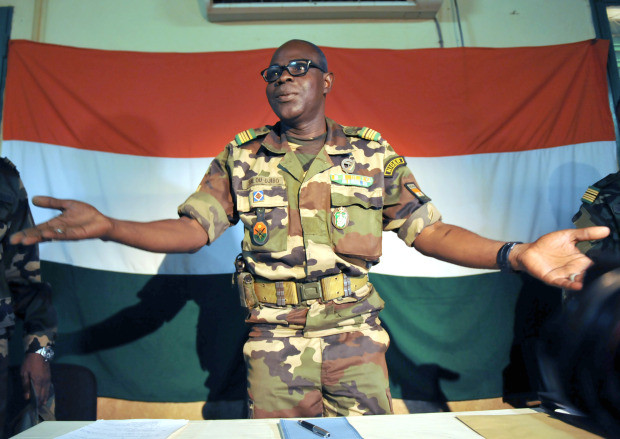The recent coup in Niger was led by Col. Salou Djibo, a “little known commander of a platoon based near the capital.” Guinea’s coup in late 2008 put the erratic and paranoid Captain Moussa Dadis Camara at the country’s helm. Then of course there’s Libya’s Col. Qaddafi, who has proclaimed himself King of Kings but hasn’t risen in military rank since seizing power in a coup in 1969.
So what gives? Why aren’t the generals the ones kicking out the countries’ regimes? I have a few thoughts.
Why not the generals? At least in the countries I know in West Africa, this makes perfect sense. Generals are often close to the leadership; their appointments are usually somewhat political and come with the benefit of a bit of patronage and a lot of pomp and circumstance. I met Generals in Nigeria who led more comfortable lifestyles than some Lagos bankers. They’re educated, often cosmopolitan, and know that they have more to lose through a coup than by simply staying put. They have no reason to upset the status quo. And at least in countries where there is a history of coups, politicians are also equally wary of annoying their military upper ranks for a similar reason.
So why not the little guys? Well, because they could never do it. The usual ranking soldier is underpaid, if paid at all. They’re often undertrained, and couldn’t mobilize the resources or strategy to get the job done. (Having said this, the little guys do often go along with a coup once it’s happening … nothing like the sense that your paycheck or next meal is moving to make you want to follow it.)
So the middle guy is the one left. They’re paid better than some, but not good enough for most. Like the coup leader in Niger, they’ve often had foreign training. They control strategic components of the miltiary — in Guinea’s case, the petrol procurement, and in Niger’s case, a platoon in the capital. They know enough people to mobilize the ranks, but they are not as politically tainted. They’re well connected but not appointees; they’ve often just risen through the ranks.
There’s one other key detail in all this: those paychecks. As happens in many salary structures in West African countries (not just militaries), each person who pays a subordinate takes a cut out of their paycheck as a “fee.” (Read: skimming off the top.) The foot soldiers get their pay skimmed by the lieutenants; the lieutenants get theirs skimmed by their superiors, and on and on it goes. Bad as this is for the low-level guys, it really bites for the mid-level people, whose salaries are picked at by their powerful superiors above. They’re managing, they’re doing serious work … and they’re not getting paid. They have a taste of power but not enough fiscal incentives not to rock the boat.
Lo and behold, you get a coup. A well trained, well connected, underpaid, and generally disgruntled middle man is your suspect — guilty as charged.
Read the original article on Foreign Policy




